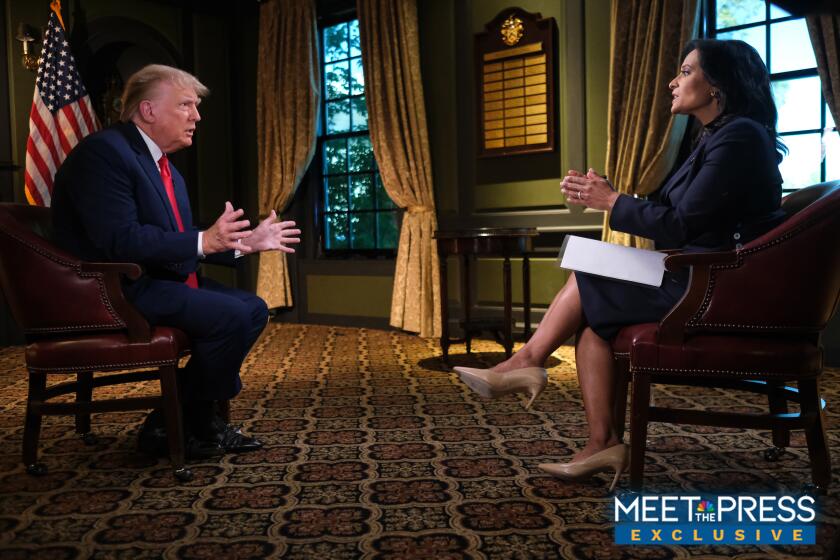Editorial: Thanks to Ohio, people who value reproductive rights have another victory

- Share via
Ohio voters on Tuesday overwhelmingly approved Issue 1 at the ballot, making it the sixth state to either pass a constitutional amendment protecting abortion access or reject a measure that would have specified the state constitution does not protect abortion rights. A seventh state, Montana, rejected a “born-alive” initiative that would have mandated life-saving care to a fetus born alive after a later-term abortion or a baby born with such severe health problems that it would not be able to survive.
It’s a remarkable achievement, and not just because Ohio is a politically conservative state. Antiabortion state legislators tried to block Issue 1 from passing with a sneaky ballot measure in August that would have raised the vote threshold for passage of constitutional amendments (like Issue 1) to 60% from a simple majority. Supporters of reproductive rights had to fight back against a campaign of misinformation.
Ohio legislators are holding a special election to increase the threshold needed to pass a constitutional amendment protecting abortion access.
For the record:
5:12 p.m. Nov. 9, 2023This editorial was updated to correct the month that the Supreme Court overturned Roe v. Wade.
Abortion also figured into outcomes in other elections around the country, notably in two states where it seems conservative state legislatures are at odds with their constituents on this issue. In the very red state of Kentucky, voters reelected Democratic Gov. Andy Beshear, who strongly criticized his Republican challenger for supporting the nearly total abortion ban in that state with no exceptions for rape or incest. One Beshear campaign ad featured a young woman who was raped by her stepfather and became pregnant but later miscarried.
And Democrats in Virginia took control of the state Legislature, campaigning on abortion rights. The state’s Senate Democratic Caucus Chair Mamie Locke exulted in a statement, “We have thwarted MAGA Republicans’ attempt to take total control of our government and our bodies.”
State and local officials are trying to concoct new ways to block abortion funds, private nonprofits that help people travel to states that still provide abortion care.
In election after election since the Supreme Court overturned Roe vs. Wade in June 2022, obliterating the constitutional right to abortion, voters of various parties in red, blue and purple states have made it resoundingly clear that they want the right to control their own bodies and that the choice to continue a pregnancy should be theirs to make, not some state legislator’s.
That is a message that all elected officials should heed as we head into the 2024 elections. So far voters in elections where abortion is an issue have made it clear that they care deeply about keeping this right in the states where they live — no matter whom they voted for in the last presidential election.
Will voters and candidates keep that in mind in 2024? This will be the first presidential election since Roe was overturned. In 2020, voters had the luxury of holding fuzzy views, or none at all, on abortion. Their rights were largely protected by the Roe decision, which blocked states from banning abortion though they could pass laws making access difficult.
Don’t let the former president con you into thinking he will support abortion rights if he gets elected.
Presidential candidates who oppose abortion are no doubt shaken (or should be) by this unbroken string of victories for reproductive rights in state elections and may soften their messaging for some audiences. Even Donald Trump, running for reelection, wouldn’t say on “Meet the Press” if he supported a federal ban on abortion, and he called the Florida six-week abortion ban, instituted by his main rival Florida Gov. Ron DeSantis, “a terrible mistake” without saying whether he would support an abortion limit.
This is absurd. Trump can have amnesia about his past antiabortion actions, but voters shouldn’t. In his time in office, he appointed three antiabortion Supreme Court justices who were instrumental in overturning Roe vs. Wade. Trump is largely the reason why people do not have a national constitutionally guaranteed right to abortion. If he were to win, and both the Senate and House of Representatives were to become Republican-controlled, a federal ban on abortion could all too easily become a reality. Voters should remember that when they cast ballots next year.
But for the moment, we cheer the voters, politicians and tireless advocates who stood up for their reproductive rights on Tuesday. There should be little doubt that people across the country value their bodily autonomy and want it out of the hands of their state legislators.
More to Read
A cure for the common opinion
Get thought-provoking perspectives with our weekly newsletter.
You may occasionally receive promotional content from the Los Angeles Times.













